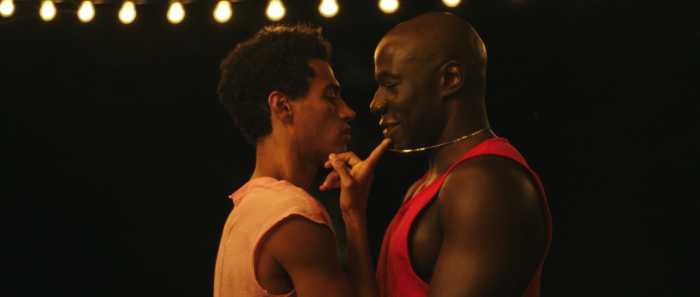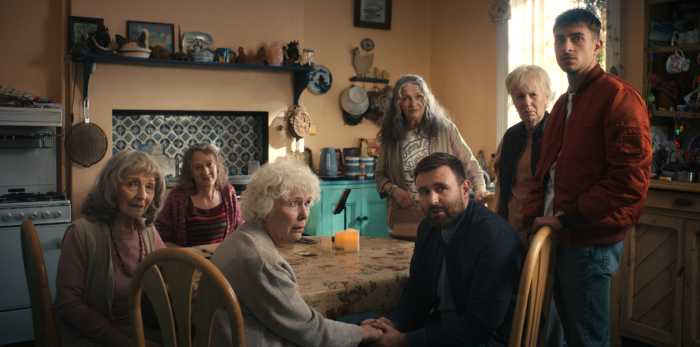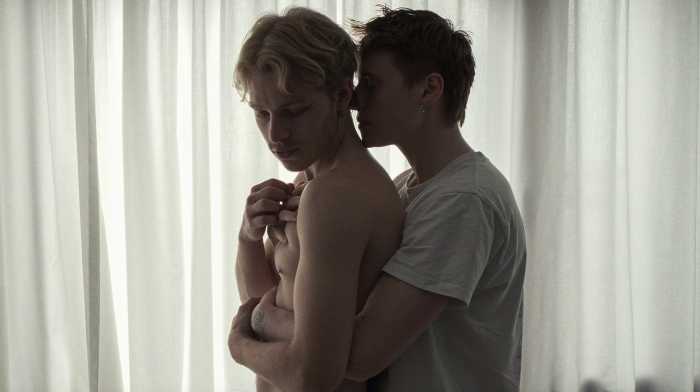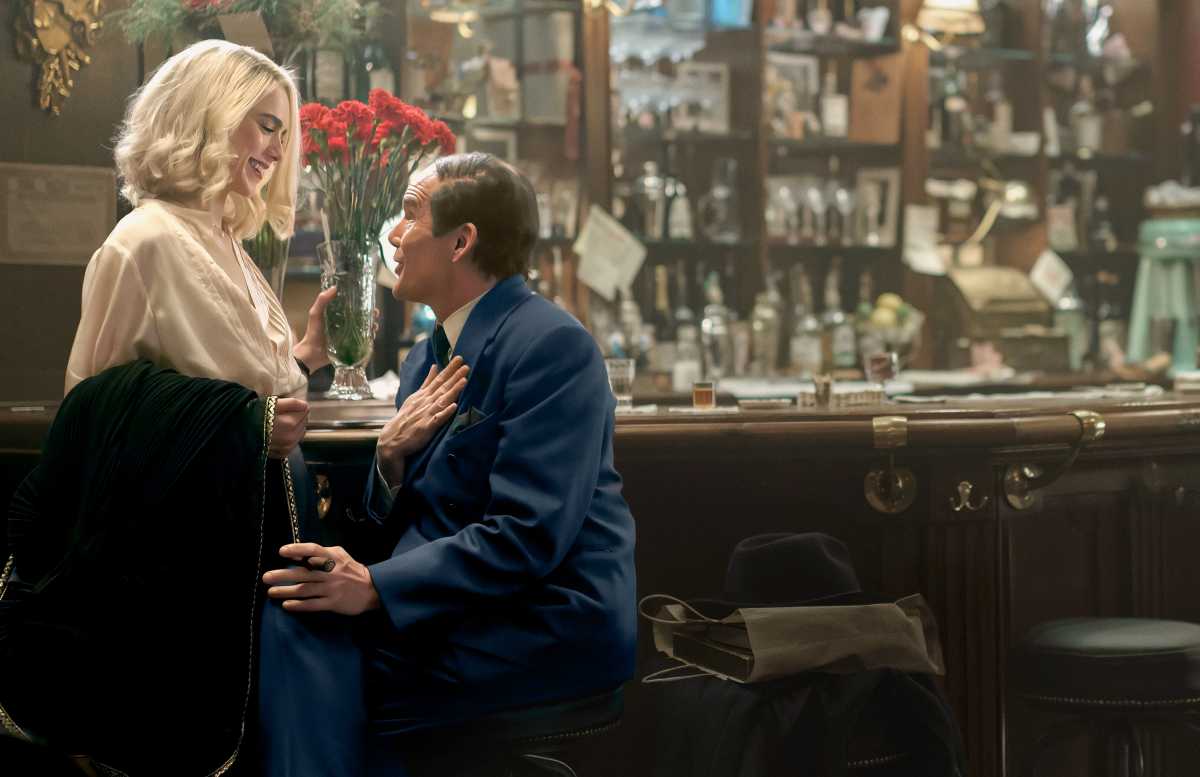The 37th edition of NewFest, New York’s LGBTQ+ Film Festival, begins Oct. 9 with the premiere of “Blue Moon,” Richard Linklater’s film about closeted lyricist Lorenz Hart (Ethan Hawke) holing up at Sardi’s on the opening night of his former collaborator Richard Rodgers’ (Andrew Scott) new musical “Oklahoma!”
The festival, which screens at various theaters as well as virtually, closes (theatrically) on Oct. 19 with a screening of “Christy,” about the queer boxer Christy Martin (Sydney Sweeney). More than two dozen films and shorts programs will be available for streaming throughout the US until Oct. 21.
This year’s program has 33 features, a dozen shorts programs, only five documentaries, and two episodic series. There are 75th anniversary screenings of “All About Eve,” “Born Yesterday,” and “Sunset Boulevard,” as well as a 40th anniversary screening of the queer classic, “My Beautiful Laundrette,” and a 30th anniversary screening of “The Celluloid Closet.”
Here is a rundown of more than a dozen notable films screening in this year’s program.
Arguably the most potent (and potentially triggering) film playing at NewFest is “Blue Film,” writer/director Elliot Tuttle’s stunning two-hander. Aaron Eagle (Kieron Moore from “Boots”) is a camboy who accepts $50,000 from Hank (Reed Birney) for an overnight. It’s a typical set up — Hank likes to watch Aaron, and Aaron likes to be watched — but there is much more between them, of course. Both men knew each other years ago, and as they reconnect, they discuss and navigate ideas about sex and desire. “Blue Film” is both disturbing and cathartic as it addresses themes of purity and perversion.
Both Aaron and Hank tell lies, but as they talk, they alternate feeling comfortable and uncomfortable with the other. Eventually they are truly honest, and it is shattering. Birney delivers a very thoughtful, nuanced turn as a man with a secret and an agenda. It is a tricky balancing act given what transpires, and Moore gives a star-making performance as the brash Aaron. Moore captures Aaron’s insouciance well — arriving with his pants unbuttoned, thinking he’s going to make easy money — only to be curled up in a bathtub after an unsettling sex act. Tuttle shoots the film very carefully, first through Hank’s videocam, then in a bedroom, and sometimes outdoors, to create a tone and mood that enhance the power plays between Hank and Aaron, and scenes featuring Aaron in a shower have disquieting meanings. There is considerable emotional pain on display in “Blue Film,” but there are several moments of tenderness and compassion, and that is why it is so hard to shake.
NewFest will host the world premiere of Alan Brown’s “Other People’s Bodies.” The filmmaker notably fetishizes his attractive cast as they hang out, swim, talk, eat, exercise, flirt, have sex, fight, and watch out for ticks and broken glass. This drama has Olivia (Annie Parisse) and her husband Seb (A.J. Shively) hosting Mateo (McKinley Belcher III) and his partner Zaki (Jasai Chase Owens) at her sister’s country home. The drama mostly involves the characters dredging up the past — Seb and Mateo hooked up years ago, and Zaki only just learns this. But Zaki comes on to Seb in one scene, and Seb may be encouraging him in another. Brown keeps things ambiguous, preferring instead to let his fluid camerawork linger on the beautiful bodies. The actors often wear little more than swimsuits, and most of the characters wear their emotions on their sleeves. When Seb sings at dinner one night, Olivia, Mateo, and Zaki all have very telling expressions in response. “Other People’s Bodies” is a very tactile film but dramatically, it is only skin deep.

The unapologetically horny “Night Stage” has theatre actors Matias (Gabriel Faryas) and Fabio (Henrique Barreira) competing for the same starring TV role. Their rivalry becomes more complicated when Matias hooks up with Rafael (Cirillo Luna), a mayoral candidate who likes to have sex in public. It would spoil the pleasures of this glossy and ludicrous thriller to reveal more, but the way each man manipulates people and things hoping not to get caught will keep viewers riveted. The actors lean into the juicy material — especially the sex scenes — which makes “Night Stage” ridiculously entertaining.
The feel-good Irish film, “Four Mothers,” has harried gay YA novelist Edvard (James McArdle) caring for his ailing widowed mother, Alma (Fionnula Flanagan), who has been debilitated after a stroke. Although speechless, Alma can still manage to make demands of and chastise her adult son using a computer. When Edvard is asked to participate in a book tour in the States, he struggles with getting care for Alma. Making matters worse, his friends all head off to a Pride event, leaving their mothers in Edvard’s care. “Four Mothers” is a bit farcical as Edvard tries to manage everyone’s needs but his own. He is given some assistance from his ex, Raf (Gaetan Garcia), a nurse, but what Edvard really needs is a backbone because he is taken advantage of too easily. Cue him denying the ladies a trip to Galway to see a medium — then getting on a bus to take them. The humor is gentle, and the emotions are sincere in this crowd-pleasing comedy.

“Queens of the Dead” is director/cowriter (and daughter of George) Tina Romero’s campy and witty horror comedy. When a drag queen is bitten by a zombie, all hell starts to break loose. But Dre (Katy O’Brian) is already having problems; her bar’s toilet is clogged, her star attraction Yasmine (Dominique Jackson) cancelled her appearance, and she has bad blood with Sam (Jaquel Spivey), who has been sent to perform. Now zombies?! As Dre shelters in place with and waits for her wife Lizzy (Riki Lindhome), she has to manage outsized personalities, including Ginsey (Nina West), a drag queen; Nico (Tomas Matos), a drug dealing party boy; her straight brother-in-law Barry (Quincy Dunn-Baker); her bartender Jimmy (Cheyenne Jackson); and her intern, Kelsey (Jack Haven), who has been wounded by an axe. The humor is broad and the bloodletting is copious, which makes Romero’s film a bit uneven. Still, the very queer cast is uniformly fabulous, with Margaret Cho a standout as Kelsey’s fiancé, who enters the chaos with a survival plan. “Queens of the Dead” will best be enjoyed with a festival crowd. It opens in theaters Oct. 24.
“Lesbian Space Princess” is an amusing animated feature written and directed by Emma Hough Hobbs and Leela Varghese. On the planet Clitopolis, Saira (voiced by Shabana Azeez) is a lesbian, and in space, and also a princess. When she is dumped by her girlfriend Kiki (Bernie Van Tiel), for being smothering, Saira, who suffers from anxiety, spirals into depression. After Kiki is captured by a trio of Straight White Maliens, Saira reluctantly takes a problematic spaceship (voiced by Richard Roxburgh) to rescue her. On her journey, she meets Willow (Gemma Chua-Tran), a singer-songwriter, who gives her a makeover, and Blade (Kween Kong), a drag queen who helps Saira summon the Labrys the Maliens demand for Kiki’s release. It is all colorful (note the rainbow sky on Clitopolis), and silly and sweet. There are some very clever sight gags (the royal pussy), fun cinematic references, and knowing queer humor. Although some of the comedy, such as the Maliens discussing the words lesbian and thespian can feel overdone, the message about learning to love yourself still rings loud and clear. It opens in theaters Oct. 31.
“Fucktoys” is writer/director/star Annapurna Sriram’s scrappy debut about AP (Sriram), a sex worker in Trashtown, who needs to raise $1,000 (and sacrifice a lamb) so a tarot reader (the fabulous Big Freedia) can lift a “curse” placed on her. AP embarks on a series of encounters with various clients, including Robert (Damian Young), who claims he may be gay, and a sexy character known as “The Mechanic” (François Arnaud), who is under house arrest. But her heart lies with Danni (Sadie Scott), a friend she reconnects with who shares her adventures. This accomplished film, which was shot on 16mm, has style to burn, but it is wildly uneven. The ensemble cast gives uniformly strong performances, but several vulgar moments are likely to test viewers’ patience. But the last sequence with The Mechanic is fantastic. This picaresque is a very “at your own risk,” as viewers’ mileage may vary.
When the lonely Johan (Magnus Juhl Andersen) meets William (Nina Terese Rask) in the intense drama, “Sauna,” he reveals, “I’ve never been with a trans guy before.” William is taken aback, but Johan’s curiosity soon leads to consent, and they start a hot and heavy relationship. However, an imbalance soon develops; William gives Johan several reality checks. “Sauna” remains absorbing as Johan becomes more self-destructive — Magnus Juhl Andersen gives a blistering performance — and he is ably supported by Nina Terese Rask, who is so marvelous, viewers may wish the film was told entirely from William’s point of view.

“Bearcave” is a slow-burn romance between two close friends, Argiro (Chara Kyriazi) and Anneta (Pamela Oikonomaki), who live in a small Greek village. Argiro is in love with Anneta, but Anneta is about to move away to live with her baby daddy in Larisa. The first act shows their last day together from Argiro’s point of view, and it involves kissing in a church. “Bearcave” then cuts to Anneta’s story, which repeats what occurred with a different emphasis and shows Anneta in Larisa, and her boredom is too palpable. The film picks up when Anneta returns to her village to reconnect with Argiro. While the performers are engaging, and there is a strong sense of place — the cinematography is beautiful — writers/directors Stergios Dinopoulos and Krysianna Papadakis lack urgency with their storytelling, which zaps the film of its emotional power. And although there is a mystical property to the bear cave of the title, this overlong film lacks real magic.
Alice Maio Mackay’s latest horror film, “The Serpent’s Skin,” has Anna (Alexandra McVicker), who is trans, leaving her hometown to go live with her sister Dakota (Charlotte Chimes) in the city. She quickly meets (and sleeps with) Danny (Jordan Dulieu), but has “day-mares” — visions that haunt her. After Anna discovers she has a supernatural ability that can cause others to bleed from their eyes or possibly go brain dead, the similarly gifted Gen (Avalon Fast), a tattoo artist, helps Anna learns how to control her powers. They soon fall in love. However, when one of Gen’s tattoos causes its bearer to make others catatonic, Anna and Gem have to find a way to stop the horror. “The Serpent’s Skin” is a modest thriller that has affection for its characters and the genre, but even with its low budget, the supernatural action and special effects feel cheap, the acting is often amateurish, and the story lacks tension. Some Mackay fans may appreciate it, but given the filmmaker’s early promise, it feels like a letdown.
“In Transit” (also streaming) is a slight drama about Lucy (screenwriter Alex Sarrigeorgiou), who lives with her boyfriend Tom (François Arnaud, from “Fucktoys”) in Maine. Lucy is secretly modeling nude for Ilse (Jennifer Ehle), an artist who just arrived in town to paint. “In Transit” has Lucy feeling trapped in her life; she wants something good for herself. (A subplot has Lucy and Tom hoping to buy the bar where she works as it is being sold.) While she finds herself drawn to Ilse, a kiss they share practically comes out of nowhere. The shifting power dynamics between Lucy, Tom, and Ilse feel undercooked. Ehle nicely underplays her role, while Arnaud overplays his; Sarrigeorgiou is just coolly enigmatic. At least this subtle film features some nice images of Maine in winter.
“Same, Again” (also streaming) is a talky, improvised drama about the various members of a theatre production. There is a “strange atmosphere” within the cast and crew, and their personal lives, not the staging of the play, is the focus here. Angela, who is producing, confides to some women that her boyfriend, Samuel, the play’s director, has raped her. In contrast, Gabi, a trans actress, is coupling up with Lorenz, who is pansexual, but they don’t want anyone to know they are intimate. Meanwhile, Manuela breaks up with her girlfriend Natalia because Natalia’s family disapproves of her sexuality. Natalia soon starts dating Arturo to please them. “Same, Again,” which is shot in a mumblecore style, works at empowering the female characters, but the whole film feels like an overlong episode of a bad reality TV show — even though the ensemble is made up of actors. Intermittently interesting, this dramatic feature doesn’t have enough drama to sustain its two-hour running time.

Two features at this year’s NewFest are virtual exclusives.
The mysterious, hypnotic Brazilian film, “Only Good Things,” has Marcelo (Live Carlos) taken in by farmer and cheesemaker Antônio (Lucas Drummond) after he has a motorcycle accident. There is an unspoken attraction between the men that leads to an intimate encounter in a shower that unites them. However, there are threats to their newfound happiness. Antônio fears Marcelo will leave, and Antônio’s homophobic father, Tavares (Norval Berbari), wants Antônio’s land. At the midpoint, “Only Good Things” jumps ahead in time and to the city where an older Antônio (Fernando Libonati) is dealing with the sudden disappearance of his husband, Marcelo. He is comforted by his hunky assistant, Eduardo (Igor Leoni), but his housekeeper, Helga (Renata Carvalho), suspects something’s awry. Writer/director Daniel Nolasco’s film unfolds stylishly, with minimal dialogue and maximum eroticism that allows for narrative ambiguity and explicit sex. What it all means is deliberately left for viewers to determine — it is designed to perplex — but the attractive cast and stunning visuals will keep viewers spellbound.
“A Night Like This” has the straight Oliver (out gay Alexander Lincoln) trying to befriend the gay Lukas (Jack Brett Anderson) first in a bar, then on a bus on a winter’s night in London. When the morose Lukas relents and agrees to pal around with the fast-talking Oliver until his 8 a.m. work shift, it is not sexual; they just walk and talk, go to a bar, or grab food. The entire time they discuss their lives, dreams, and frustrations and encounter various people who have an impact on their night. The conversations range from serious to silly, which makes “A Night Like This” rather bumpy. Oliver can be sweet, but he is also boisterous and, at times, irritating. His bluster masks a real fear, which eventually comes to light. Lincoln sells his character — especially when he spouts heartfelt speeches in a bar or to Lukas. In contrast, Anderson gives a more internal performance and is at his best during a moment of honesty. While there is mild sexual tension between the leads, there is not enough satisfaction when they do finally kiss, which this lowers the stakes about wanting them to couple up. “A Night Like This” is kind of like Oliver — it will either charm or annoy viewers, possibly both.
“NewFest” | October 9-21 at various theatres and online





































